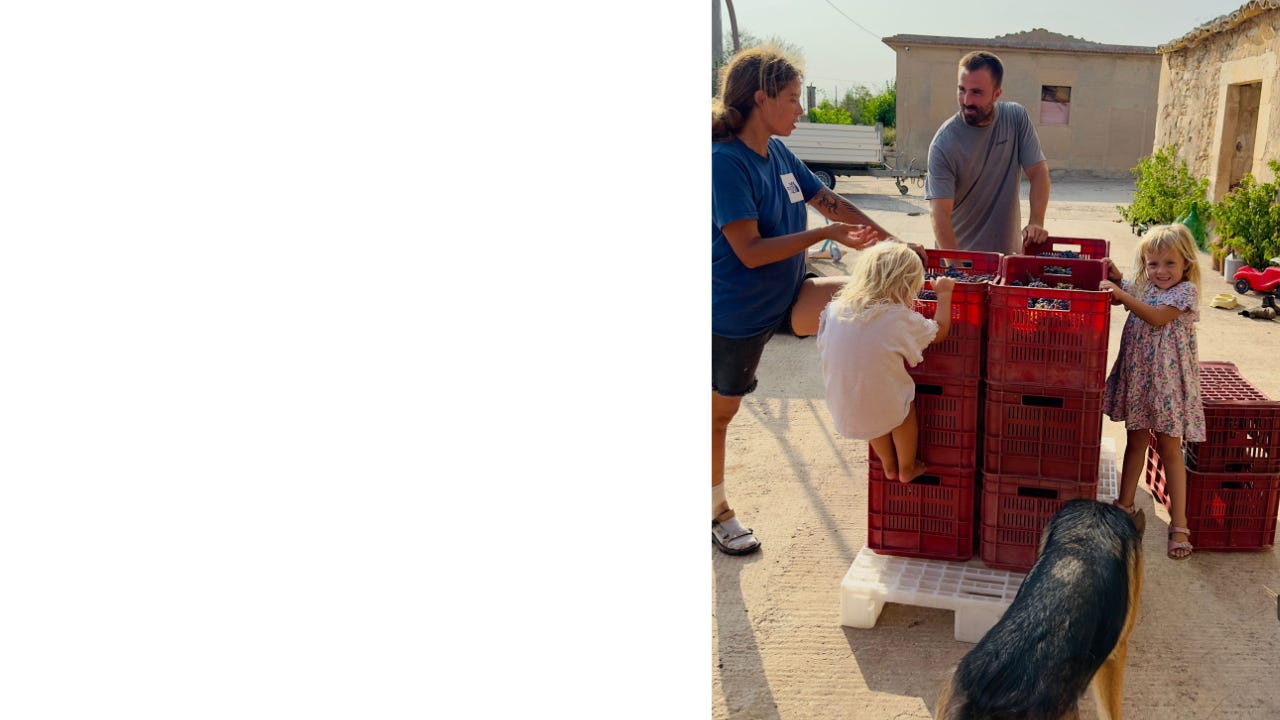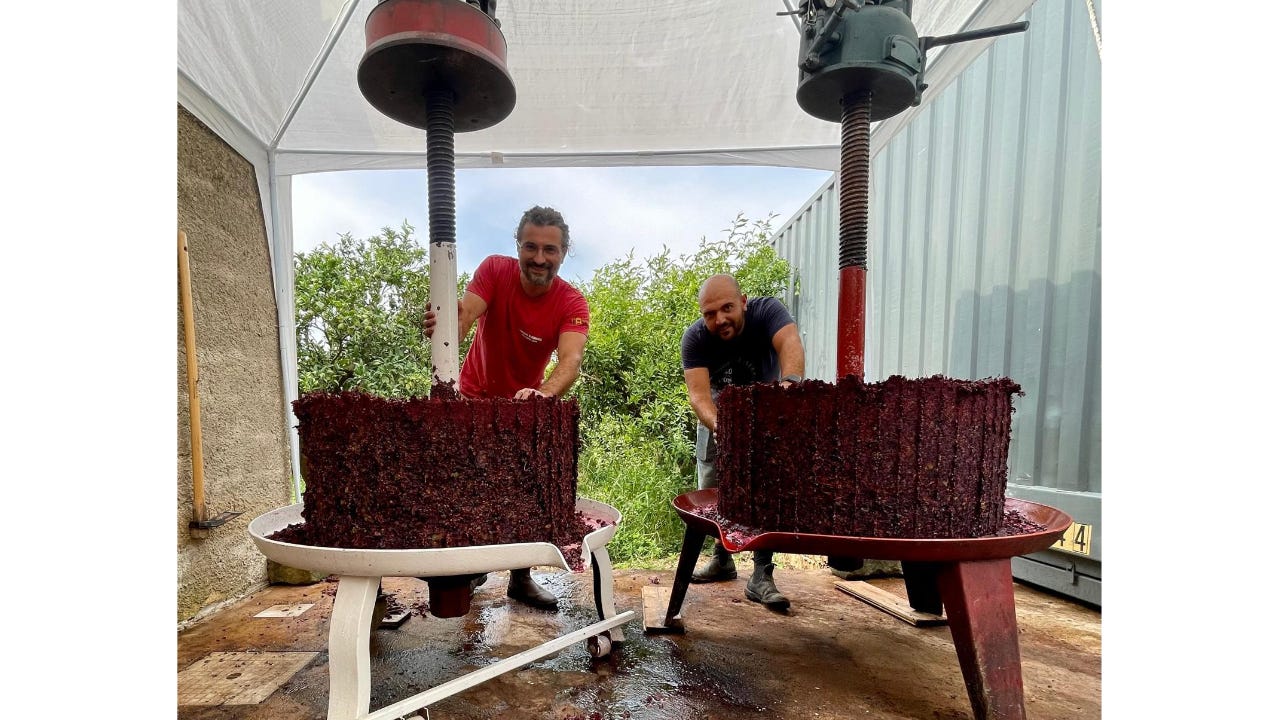Sicily is on everyone’s lips these days, still riding the wave of last season’s The White Lotus hype. In the wine world, the island is also on trend, thanks in part to high-profile events like Le Contrade dell’Etna and Sicilia En Primeur, which attract hundreds of international attendees each year. But while interest grows, the Sicilian wine industry, like many others worldwide, is grappling with a host of challenges, from shifting consumer habits to a changing climate. In recent years, the island has faced record heat waves and extreme weather events, including the worst drought in two decades, followed by summer hail storms last year. Against this dynamic backdrop, five emerging winemakers are rising to the challenge, navigating unpredictable market and climate conditions while staying committed to sustainable farming practices.
By Sophie Renhuldt: Everyday Made in Italy PR, weekend winemaker. Yapper.
Kalma, Chiaramonte Gulfi
In Chiaramonte Gulfi, near Ragusa, Kalma has been cultivating 5 hectares of grapes, olives, citrus fruits, and other local bounty through regenerative practices since 2023. At the heart of the project are Nik and Waiata, from Germany and New Zealand respectively—both well-read and well-traveled—who first met in Sicily during the 2019 harvest. They returned to the area, known as the “Balcony of Sicily” due to its panoramic position, after working in wine across France, South Africa, Australia, and beyond, deciding to lay down roots and raise their children here. Kalma’s production focuses on native varieties such as Frappato and Nero D’Avola, with new vineyards of Grillo, Zibibbo, Muscatedda, and Albanello—a nearly extinct Sicilian grape—currently in the growing stages. Six colourful labels are available for those lucky enough to get their hands on one of their 10,000 bottles: three red wines and one sparkling from their own vines, as well as two white négoce wines produced from grapes sourced from friends in Marsala and Noto. Sans sulfites ajoutés, non filtré, as they say.
Gilì, Torretta Granitola
On Sicily’s western coast, south of Marsala, Alice and Ermanno (both winemakers in their twenties) founded Gilì in 2023. Working just under 3 hectares of vines in Torretta Granitola, a sleepy seaside village with little more than 100 inhabitants, the choice of terroir was both sentimental (Ermanno grew up spending his summers here) and strategic: their sea-facing vineyards are protected by the surrounding nature reserve in an area that has yet to be fully explored for its wine making potential. Native whites like Catarratto and Grillo truly shine here, as seen in Gilì's three white labels, but this hasn’t stopped the duo from venturing into reds, with a forthcoming Syrah blend set for release this year. As of 2024, the bootstrapped couple have grown their production from the ground up to 4,200 bottles, exporting to Korea, Switzerland, Denmark, and the UK. New projects include the construction of Gilì’s first wine cellar, while continuing to nurture other cultivars on the land, such as olive trees, from which they produce oil.
VINB, Chiaramonte Gulfi
With vineyards situated up to 500 meters above sea level, between Bastonaca, Licodia Eubea, and Chiaramonte Gulfi in the Regusan countryside, Vittorio and Biagio have been making (and drinking) wine together since 2020. They first experimented with micro-vinifications from rented plots before officially launching VINB in 2022. Born and bred Sicilians, both spent time off the island before settling here with their respective families: Biagio in London, working at one of the city’s most iconic grand hotels, and Vittorio in Turin, pursuing a career in IT. United by a shared understanding of what makes a good wine (and a good life), they returned to Sicily to work their native land through sustainable and regenerative farming practices, focusing on indigenous red grapes like Frappato and Nero d'Avola, as well as Tonda Iblea olives, from which they produce organic olive oil. VINB’s deep-rooted connection to this part of Sicily is particularly palpable in their latest red wine, D'altri Tempi—a homage to Sicily’s famous Cerasuolo wine, replicating its style from over 50 years ago.
Sergio Genuardi, Casteltermini
Casteltermini, north of Agrigento, is renowned for its natural abundance of sulfur and chalk stone, and much less so, if at all, for its winemaking. The local tradition was mining, and when the mines closed, the lands became pastoral or semi-abandoned, rather than being used for viticulture. This condition had always puzzled Sergio, a winemaker who grew up here, especially given the optimal soil conditions, rich in limestone and particularly chalk. After studying and working across Italy, Spain, Portugal, and Romania, he seized the opportunity to explore the potential of his homeland in 2021, purchasing a rare 1.3-hectare plot planted with Nero d'Avola, Perricone, and Catarratto from a family friend. Overlooking the Platani Valley at up to 600 meters above sea level, Sergio was immediately struck by its biodiversity—countless wild herbs, grasses and flowers, all thriving on the chalky soil. He hasn’t looked back since. Four thoughtful and inspiring labels are currently available, with a total production of 7,500 bottles—all the result of tiresome handwork and a low-intervention philosophy.
Medit3rraneo, Marsala
In Marsala, three friends are breathing new life into the area’s oxidative, unfortified wine making tradition with a “side hustle” to watch in the coming years. Committed to crafting sunny Mediterranean wines and promoting sustainable agriculture in an increasingly abandoned area, Giulio, Fabio, and Paolo set off in 2023 with a base wine to start their Perpetuum – a local oxidative wine that undergoes a lengthy aging process where wine is drawn and replenished annually from the same barrel, blending old and new vintages. The same style was first encountered by Woodhouse in 1773, before being fortified with brandy to protect it on the journey back to England, leading to the creation of the Marsala wine we know today. While their Perpetuum rests in a 13hl barrel, the trio are keeping busy with dry whites. Their 2024 Catarratto-Zibbibo blend will be released this year, produced from organic certified grapes partially sourced from winemaking friends that used to sell to the local historical cooperative, and partially cultivated on a rented 0.2-hectare vineyard, from which they hope to make a Cru next year. Alongside the Perpetuum, a semi-oxidative white is also in the works, but those wanting a taste will have to be patient.









Thank you again for this “deep dive” newsletter. Really love them, always. Only one problem…i need a glass of wine..now🫣